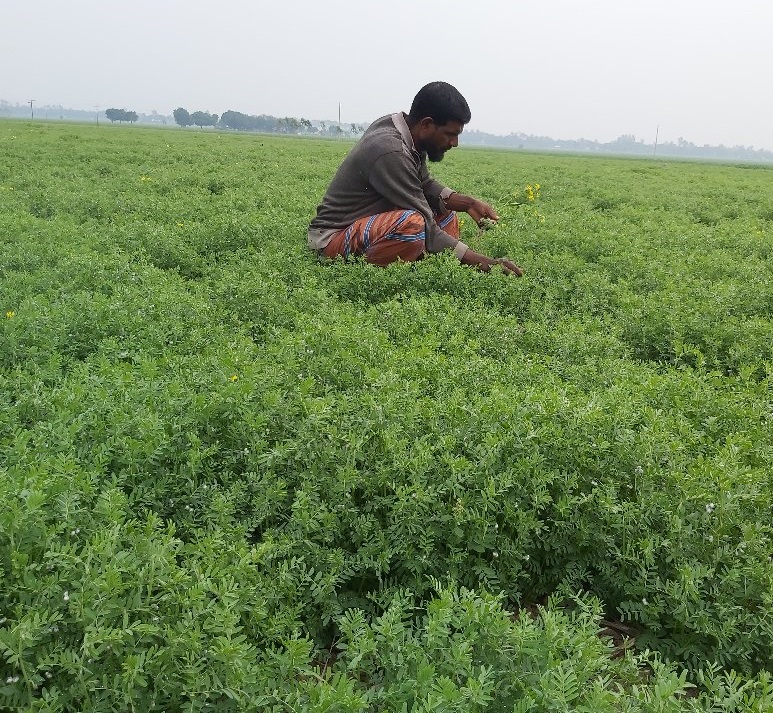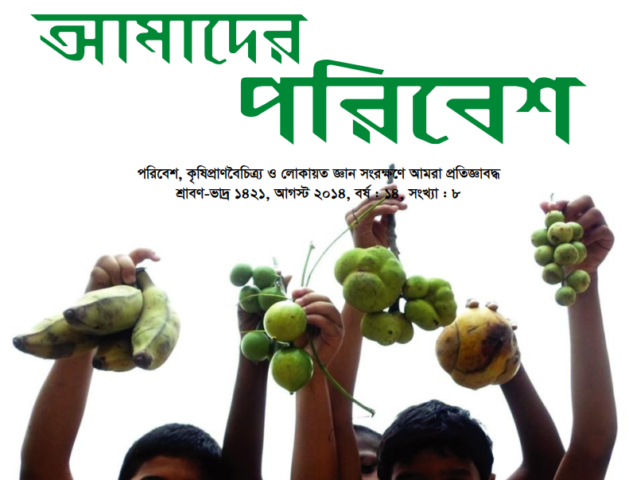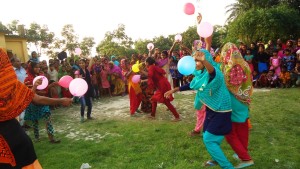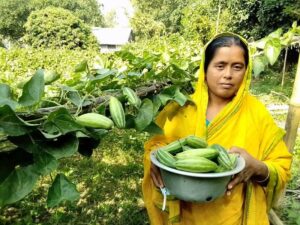Amrito Sarkar from Rajshahi
There are lands and lands filled with lentils. Farmers of the area recently concentrated on cultivating crops that consume less water. Lentil is such a crop which requires less waters for producing yields. The area where those lentils are seen being cultivated by farmers is Dubail village in Tanore upazila of Rajshahi.
Md. Liaquat Ali (48) is a farmer of this village. His father is late Nur Mohammad. After studying up to higher secondary he chose to get involved in the traditional occupation of his ancestors which is agriculture farming. He wanted to change his fate by getting involved in farming diverse crops rather than chasing for jobs. He has 4 bighas of land and has been farming paddy and other crops to make his occupation profitable one.
In order to make his profession profitable with the help of seed from Barind Seed Bank, he started cultivating the local variety of paddy which has higher market price. He leased some land and started cultivating more paddy in the hope of making more profit. But being a Barind region, the yield would be reduced every season due to water scarcity. This would have increased the production cost! He noticed that even if the paddy of Aman season is rain-fed, the yield would be reduced due to water crisis at the peak stage of paddy.
However, in the Rabi (winter) season of 2014, 20 kg lentil seeds were provided to 4 farmers of Dubail village in collaboration with Barindra Seed Bank and BARCIK. These seeds were distributed to farmers encouraging them to farm crops that require less water for releasing pressure on ground water of the Barind Tract. Among these four farmers Md. Liakat Ali was one who got lentil seeds to cultivate in his one bigha of land.

That is where the real change began. In this regard, Liaquat Ali said, ‘I did not know much about Rabi cultivation at that time. I was given seeds and technical assistances from BARCIK. I myself have observed the details of the first year Rabi cultivation very well. I realized that by cultivating this crop, farmers in our area, including me, would benefit.’ He went on saying ‘by returning 1 kg of seeds to Barindra Seed Bank, I save 60 kg of seeds for cultivation next year. I also earned cash of 14 thousands selling 8 mounds of lentils after deducting all the expenses. The other three farmers benefit in the same way. ‘
In the meantime, irrigation dependent Boro paddy was cultivated in large quantities at Dubail village at that time. Besides, potato was also cultivated. Since lentils and other Rabi crops were cultivated on less land, sometimes Rabi crops were also damaged due to water leaking from the adjacent paddy or potato lands. In this regard, Md. Liaquat Ali said, ‘In fact, lentil farming was not considered important by many at that time, but now the day has changed. In our village there is very little Boro cultivation now, Rabi cultivation is much more now. ‘Md. Liaquat Ali is now farming crops in 19 bighas of land on lease along with his own 4 bighas of lands. During this year Robi season, he has cultivated lentils in 10 bighas of land, peas in 2 bighas of land, mustard in 1 bigha of land and potato in 6 bighas of land. He said, ‘I have gained experience in Rabi cultivation for 6 long years. Farmers from many nearby villages come to me for advice as my Rabi crop yields well.’ ‘I have given advice to 28 farmers of Sahapur, Prakashnagar, Koelhat and Dubail villages to cultivate lentils in 92 bighas of land, peas in 8 bighas of land, mustard in 10 bighas of land and khesari in 5 bighas of land’-he added. He went on saying, ‘I have provided assistance to farmers who want to cultivate Robi crops to reduce the use of underground water for irrigation of Boro rice.’
While saying about the success of farmer Liakat Ali in farming Robi crops and reducing use of water social worker and former UP member Md. Zaidul Islam (55) said, ‘Liaquat Ali is far ahead of the farmers of the surrounding villages in cultivating Robi grains. He is educating his three sons by cultivating such crops and has built a good house. The biggest benefit is that his work is playing a big role in solving the water problem that we have in crop cultivation in this Barind region.’
Translated by Silvanus Lamin



